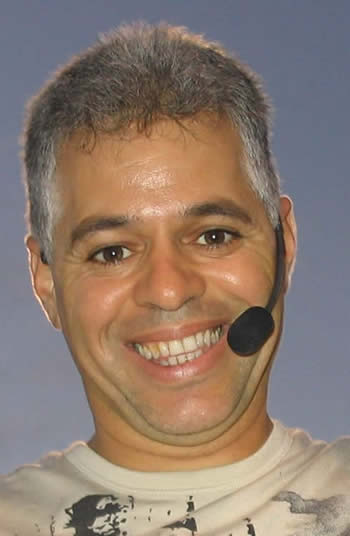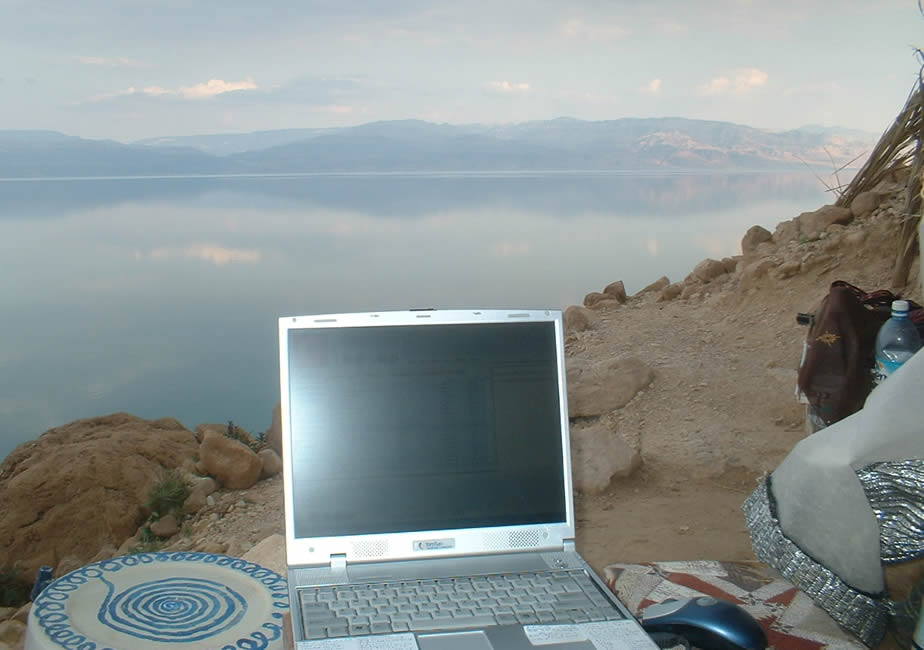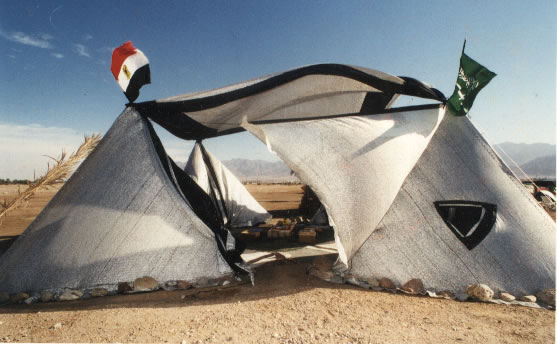| The
Purpose of HEALING - K.I.S.S.
- as stated 12 years ago - was and is
to help me and my potential P E E R s
"to HEAL ourselves into WHOLEness,
and - by extension - all of CREATion!" |
|
I focus my experiencing and awareness on being
"a pioneer of Evolution
in learning to feel":
I let my Body vibrate and my Heart 'womb'
pain, shame, fear, boredom, powerlessness,
so feelings can >heal >guide>fulfill>evolve,
and ~~~ offer ~~~"goldmines"~~~ to us all!!
"I
want you to feel everything, every little thing!"
|
|
K.I.S.S. -
L O G 2
0 0 8
Keep It Simple Sweetheart
| |
1 |
2 |
3 |
4 |
5 |
6 |
7 |
|
|
1
2
3 |
How
Learn
And |
I
The
Train |
Heal
Conditions
In |
Myself
For
Creating |
|
Whole
On
Conditions
|
Self-acceptance
Earth
Daily |
Click!
|

Then those who see Ha-Shem, will talk
among each other,
and he listens and he
hears
yatakaalamuna allathina
yarau'na-hu ,
va-yusri va-yasma'
Dann die IHN schauen, werden reden miteinander,
und er lauscht und er
hoert
Puis ceux qu'ils voient Ha-Shem, se parlent
l'un a l'autre
il entends,
il ecoute
|
It seems that I chose 26 actors
for my life's drama and those 26 actors chose me! One
common trait of all roles is "mutual dependency"
between them and me.
With 16 actors - my family - the mutual
dependency is life-long! With my landlords
at Arad & with my 6 starchildren, born
between 1986-88, it may be temporary.
My children: Immanuel, Ronnit, Micha; my
children-in-love: Efrat, Uri, Ra'ayah; my 10 grandchildren [born
1987-2005): Elah-Alon-Tomer-Mika; Jonathan-Rotem-Yael-Itamar;
Arnon-Ayelet
My landlords: Ofir & Meital+ Lior (2002) & Amit (2005).
My starchildren: Lior Oren, Zipi Winkler , Dina Strat , Meshi
Taib, Gal Mor, Boris Arons [26=YHWH=13+13=ahavah+ahavah =LOVE!]
|
Intro
to
k.i.s.s.-l o g + all
dates
~ Library of
7 years ~ HOME
~ contact ~
SEARCH
( of Latin characters only!) my
eldest granddaughter's video-gallery
|
|
2008
November 19
Cheshvan
21
Levi's 46th birthday
Wednesday
|
|
|
Actions:
I never mentioned, that it's at my children's that
I wash my hair, since when in Arad I go to the pool & never
shower at home.
Kisslog: healing-creating
TV & Internet: learning
Washed dishes, watered plants
|
Interactions:
with Efrat & Mika
(no camera...)
SMS to Levi, long birthday-talk:
thanksgivings & wishes!
Immanuel
skype from Hong-kong, about new camera.
Decision: NOW!
ph
from Lior Oren, postponed |
|
The FOCUS of MY INTENTION
TODAY
Know exactly what you want, communicate clearly what you want,
then get out of the way, live and play, and let happen what
may
11:52
I desire that Levi's
dream - which I let him phrase clearly
during our birthday phone-talk
- may come true:
"I wish to have a name in
the world in the realm of teaching CHILDREN to DANCE ",
which means:
"May I, - once a troubled, violent child - help children
all over the world to use fun-full dancing
as a healthy way to discharge bottledup feelings which otherwise
would explode in violence."
I desire that everyone in my family may accept Levi the way
"my brother Immanuel accepts
me"!
I desire Levi to awarely and intentionally relate to his body
as to his partner
I desire him to focus on imagining his vision & not crave
for recognition, NOT be a "Petitioner"! |
|
|
hodayot [thanksgivings] for
today
12:31
My Body, my Partner,
my God
I give thanks
to the bones, joints and muscles in our legs, feet & knees,
in our spine, ribs and shoulder-blades,
in our arms, elbows, hands and fingers,
and to all systems, brain, blood, breathing etc. etc. etc,
which all work together as one grand orchestra,
when I DANCE!

I am grate-full that Levi chose me as an actor in his life-drama,
just like I chose him as an actor in mine.
I am grate-full that I was meant to be one of his "angels-on-the-abyss",
and that I am allowed to watch the results of this up to this
present time.
I am grate-full that after 39 years Levi and Immanuel are
still friends
(and one day might also "become equal", as is said
in the song of this day!)
I am grate-full that Levi finally found the love of his life
- Ayelet-
and that he - after all - became the father of two daughters.
I am grate-full to be priviledged to be with my loving daughter-in-love
and with Mika, - her determination, her perseverance, her
creativity....
|
Song
of the Day
To my surprise I see, that it was on this
very day last year, i.e. Levi's 45th birthday,
 |
You
are white, I am black
I am dark, you are in the light
which warms like a mother,
which cares for you.
You are small I am big (or tall)
I want to, you are able to
dance and march forward,
to be whole among people,
And perhaps a day will come and we'll
become equal,
you will be a river for me, and I'll be oceans for
you
and we'll flow together to infinity
a second before the line of the shore arrives.
I cry, you scream,
I am wrong, you are right,
this is our drama,
and there is no audience and no stage,
Perhaps we should sit and rest
you are you, and I am I,
let's dance , march forward
let's be whole among people.
And perhaps
a day will come and we'll become equal,
you will be a river for me, and I'll be oceans for
you
and we'll flow together to infinity
a second before the line of the shore arrives
|
|
|
 |
|
Israeli
phys ed teacher uses movement to break down barriers
By Abby Margulies May 10, 2006
At an early age, Levi Bar-Gil discovered that
being light on his feet was a great way to stay out of schoolyard
fights. Today, the Israeli physical education teacher and dance
specialist is teaching others to use movement as a means to
replace violence.
Using a self-created method called Movement
in Time (MIT) Bar-Gil combines popular music and simple communal
movements to promote non-violence and to help cultivate an inner
desire for peace. MIT is effective with young children, teenagers
and adults, according to Bar-Gil, because it allows people to
break down barriers - both within themselves and with the people
around them.
"I have found that when you build an atmosphere,
using humor, love, and play, kids will learn much more than
if you force them by giving them orders,"...
Bar-Gil's techniques have worked both at home
and abroad. In addition to providing guidance and instruction
to Israelis, Bar-Gil has taught his MIT technique throughout
the US and Europe. Most recently he traveled to California State
University, Chico, where he was a guest lecturer.
There, Bar-Gil led a series of workshops called
"Dancing for Peace," where he taught students and
adults how to teach his MIT dance method, as well as leading
classes for a variety of age groups.
"It was very successful, and they kept
asking when I was coming back - why I wasn't staying. Even if
they didn't understand the Hebrew words of the song, they still
liked the rhythm of the music."
He was initially invited to come and teach
at Chico State by his friend Michael Leitner, a recreation professor
at the university, after Leitner saw his work. He has since
been back five times.
"My goal is to find the commonalities
among people, not the differences. Using
the MIT technique we can find the thing that connects us, and
puts us all on the same level. This method allows people to
succeed from the beginning in the specific way that I have created,
and can help us to see that everyone is the same all around
the world."
The foundation of MIT is basic steps,
hand movements, and body and hand positions, which are mastered
and then used in more complicated ways. The initial simplicity
allows all of the students to take part and become motivated,
and then gives them the confidence to move on to the harder
steps and more complicated dances. Using 25 basic moves in different
sequences, Bar-Gil has developed a wide repertoire of dances
for his MIT series. ...
More than just dancing to build self
confidence and have fun, Bar-Gil has found that
engaging children in physical
activity, specifically
dancing, both in the classroom and at recess, helps them to
develop positive behavior, and to formulate a type of self-expression
beyond violence - a concept that came to him through his own
personal experience.
"When I was young, I was a very problematic
child. I came from a house that couldn't afford to give me almost
anything, so I became a street boy. Solving problems was usually
done through fighting."
Unlike so many others, Bar-Gil was lucky enough to find a physical
education teacher who took him under his wing and introduced
him to gymnastics. Still an inspiration to him today, Bar-Gil
recalls him fondly. "He is my ideal
person. He always talked about giving everyone the opportunity
to participate in something, and he helped me to become number
one in my school for gymnastics. He helped me to choose the
positive way over violence, and it became my wish to be able
to give something like this back to society."
....................................
Having created approximately 160 dances for
children, Bar Gil is currently teaching a course at Tel Aviv
University on how to teach dancing in kindergarten.
"When I see what I've done, I believe
that until now, even though I am improving my technique, I have
achieved one of my main dreams about why I came to this world.
It seems to me that through this experience I have achieved
one of the main goals in my life. This isn't the end, but this
is the way."
|

See
the long list of Levi's dances
Levi is also the chairman (and founder? ) of
the Association of folk dance instructors
& choreographers in Israel and abroad


|
Big Brother Drama yesterday
The community became
exactly this: a community!
It was great to watch and to virtually participate!
"You see, it is, because that Tzabbar
left!"
exclaimed Efrat several times.
And nobody was troubled by the fact,
that "the public" did not care enough about Hagit
to leave her in the house.
It also was all too clear, that she wanted to leave herself,
yearning for her children.
|
From the movie - (in the frame of 3SAT's competition
about the best German film of this year:
Der schwarze Loewe
"In Nigeria we say: turn your face to the sun,
then you'll have the shadows behind you",
Synchronicities
The last work on K.i.s.s.-log which I had done before leaving
for the pool,
and later -traveling north -
was the "completion" of the page
October 19
and on it the coincidences with my neighbor Albert.
I was again very moved, when I read my finetuning then
and regretted, that I hadn't taken a picture of Albert himself,
only of his house.
and of course of the "Arc de Triomphe" and of the
bird's nest and my books.
Since I had to run home again - to get my forgotten dentures
- and back again,
I was almost too late for the pool (13:52
- while at 14:00 it's closed for pensioners),
and for the bus at 14:30.
Still I quickly ran to the jacuzzi, and whom did I find there?
Albert!
If I hadn't been late, I would have not met him or would I???
I may have encountered Albert 2 or 3 times around the pool
, but never inside,
and definitely never in a situation where talking was the
most natural thing to do.
Though I was time-pressured, I expressed my utter surprise
to meet him there,
and told him,
how important that accidental meeting between us on Oct. 18
had been.
He was very pleased and interpreted the significance of that
incident
as his success in having given me love and kindness:
"When I am engaged in one of my
actions as a volunteer,
it is much more important for me to relate to the people with
love
than to give money.
Do you know about Mother Theresa?
She has given so much love for so many years, in Egypt and
in India!"
I listened with joy and asked:
"And you, you want to act like
Mother Theresa?"
"Oh, I'm not worth the nail on her toe! But I try my
best."
When he agreed, that this time I would take his picture,
I jumped out of the jacuzzi, got my cellphone from my bag
on a chair ,
and before he could ask: "Should
I smile", I had already photographed him!
We said Shalom to each other and I entered the pool for ten
minutes.
When I was just climbing out of it, Albert passed by and waved
with his hand.
I quickly grabbed my bag and towel, but chose the exit via
the outside stairs.
As usually I ran, and that's how it happened, that we met
a third time,
when I opened the entrance glass door from the outside
and he just passed by inside.
What does this mean?
I couldn't help wondering, if Albert could be a potential
peer.
He is outstandingly "nice" , always with joy and
laughter,
and I like his coming from a French (or Northafrican?) background.
But what about EQUALITY? -
Leave alone his wife,
who for an unknown reason has hated me from the beginning.
I took care to not bump into her more than 3-4 times in these
4 years.
But Albert also brought her twice intentionally,
once to help me with my computer (but she couldn't),
and once to help me with the washing-machine,
which Ofir had "inherited" from them,
since he wanted to install it in his-my flat.
See "washing-machine"
on Jan. 7 and Albert's
washing-machine on Sept. 5
There is also that one incident which put me off totally,
also from Albert:
2 years ago I had asked him, if he could water my garden during
my absence,
I had dared to ask, since he claimed to appreciate my garden
so much.
When I came back, he complained, that watering had cost him
a total hour,
and that Tzakha, his wife, was very angry: "Why
do you......!"
What I hated , was not that he didn't want to waste one hour
on my garden.
Nor did I blame him, that he couldn't do the same job in 20
minutes as I can.
But why did he drag his wife into it?
And why did he make himself a victim to her?
This I did and do judge, and I'm glad I remembered this now,
in order to not get carried away with a dumb fantasy!
|

 The "Arc de Triomphe", as Albert
came to call it a year ago
The "Arc de Triomphe", as Albert
came to call it a year ago

|
Nourishment from Others
|
I hate it, when 3SAT "forces
me"
to watch not only a movie every day, but two on one
evening.
But they are the 12 best German movies of the year,
and I "SHOULD" see them.

3sat-Zuschauerpreis 2008
Wählen
Sie Ihren Lieblings-Fernsehfilm:
Wir zeigen Ihnen zwölf hochkarätige Fernsehfilme
und Sie entscheiden,
welche der Produktionen den 3sat-Zuschauerpreis bekommen
soll.
Of course, I'm not voting,
how can I vote, before I've seen all 12, and not only
once.
I already missed those of Sunday, and the first on Tuesday,
because "Big Brother" was more important after
all.
Nor do I have the time to dive into all the five I did
see so far.
But these five were "worth the effort" and
tireness late at night,
even the thriller "Fleisch" (flesh or meat,
both!) did fit into my criteria
|
|
|
|
12
heisst: ich liebe dich
Die Geschichte einer ungewöhnlichen
Liebe: 1981 verliebt sich die im Stasigefängnis inhaftierte
Regina Kaiser in ihren Vernehmer, Uwe Karlstedt. Jetzt wurde
für die ARD diese Geschichte verfilmt - in den Hauptrollen:
Claudia Michelsen und Devid Striesow.
Es ist die Geschichte einer ungewöhnlichen
Liebe zwischen zwei Menschen, die unterschiedlicher nicht sein
könnten: sie eine Staatsfeindin, er Stasioffizier. Schauplatz
dieser "Liebe paradox" ist das Stasigefängnis
Hohenschönhausen. Hier landet Regina Kaiser 1981 wegen
"landesverräterischer Agententätigkeit"
und verliebt sich in Uwe Karlstedt, ihren Vernehmer. Jetzt wurde
diese nach Rosamunde Pilcher im Stasimilieu klingende Geschichte
verfilmt. In den Hauptrollen Claudia Michelsen und Devid Striesow,
beide mit DDR-Vergangenheit.
Regina Kaiser verbringt acht Monate allein
in einer Zelle. Erträgt Isolation und Demütigungen,
weil sie weiß, es gibt dieses schäbige Vernehmerzimmer
mit dem Mann, den sie liebt, obwohl er eigentlich eine Bedrohung
für sie darstellt. Mehr als Zigaretten kann er ihr nicht
bieten und sie? Verschlüsselt ihre Nachrichten an ihn mit
Zahlencodes. 12 heißt: Ich liebe dich.
Uwe Karlstedt hat nie überlegt, ob er sie retten kann.
Nie daran gedacht, seine Arbeit aufzugeben. Er erspart ihr nichts.
Ihre Liebe erschüttert sein Gefühlsleben, aber nicht
sein Weltbild.
Filmszene: Uwe Karlstedt fragt Regina Kaiser: "Könnten
Sie sich vorstellen, jemanden wie mich zu lieben? Könnten
Sie sich vorstellen, jemanden wie mich zu küssen?"
Im wirklichen Leben geschah folgendes,
erzählt Regina Kaiser: "Nachdem
ich gesagt habe, das geht einfach nicht, weil, ich bin ja ein
Stück Papier oder so, da hat er gesagt, na, dann gib mir
mal deine Hand. Und dann hat er so seine Hand hingehalten, und
ich habe ihm dann einen Kuss gegeben."
Sie küsst den Mann, der sie für
drei Jahre ins Frauengefängnis
nach Hoheneck bringt. Nach der Wende kehrt sie nach Hohenschönhausen
zurück, führt Besucher durch das ehemalige Stasigefängnis,
das inzwischen Gedenkstätte ist. Und sie sucht nach ihrem
Vernehmer, von dem sie nur den Vornamen kennt.
Dann treffen sie sich doch, und ihre Liebe beginnt von neuem.
Sie verlassen ihre Familien, ziehen zusammen. Ein filmreifes
Happy End, wenn da nicht die Kritiker wären. Das Verwischen
der Grenzen zwischen Täter und Opfer, die öffentlich
gezeigte Liebe zwischen beiden, verletzt Tabus.
Das meint auch Hubertus Knabe, Leiter der Gedenkstätte
Berlin-Hohenschönhausen: "Zum
einen entsteht in der Öffentlichkeit ein falsches Bild
über die Zustände hier in der Haftanstalt, wo das
Verhör eben die schlimmste Zeit im Leben der Häftlinge
war und nicht der Beginn einer Liebesbeziehung. Und zum zweiten
ist dieser Fall auch in keiner Weise belegt."
An einem Ort der Angst finden sich keine Dokumente verbotener
Zärtlichkeiten. Wahr ist, dass sich die beiden 1981 dort
begegnet sind. Fünfundzwanzig Jahre später heiraten
sie. Die Liebe hilft ihnen, erlebte Traumata zu bewältigen,
mit Schuld und Feigheit
fertig zu werden. Ein großer Stoff für
einen ungewöhnlichen Film, der uns mitnimmt in die Abgründe
der menschlichen Seele.
Pressematerial
Claudia Michelsen zum Film:
Frau Karlstedt, was ist Ihre
grausamste oder schlimmste Erinnerung an diese Zeit?
|
Trauter
Feind
Trauter Feind„12 heißt: Ich liebe dich“ erzählt
eine sehr ungewöhnliche deutsch-deutsche Liebesgeschichte.
Bis auf Beginn und Nachspann wird auf Musik verzichtet.
Was, wenn der Fall nicht von der Realität beglaubigt wäre?
Hohnlachen würde der Zuschauer, die Augen verdrehen des Kitsches
wegen. Aber es ist so: Zwei Menschen, die getrennter kaum sein
können, verhaken sich im ersten Moment ihrer Begegnung. Bettina,
deren Westkontakte das Ministerium für Staatssicherheit aufgedeckt
hat, wird ins Vernehmungszimmer gebracht. Es tritt ein: Jan, der
Vernehmer. Der Stasi-Offizier ist jung, sieht mit seiner Stirntolle
noch jünger aus, sein Gesicht hat nicht die Kontur des brutalen
Verhörers. Die Stimme ist weich gezogen.
Schon das ist unheimlich. Der Rezensent, der ein Wessi ist,
kennt Stasi-Leute nur aus den Medien, die meisten kennt er aus
dem Fernsehen. Emotionslose Zeitgenossen, in sich verbissene
Menschen, Schattengestalten. Jan ist anders, er will zum Ziel,
klar, er will Bettina zum Geständnis weniger zwingen als
überreden, immer freundlicher wird er. Bettina, zermürbt
von der Haft, unterschreibt Papier für Papier. Drei Jahre
wird sie ins Gefängnis müssen, sobald Jan die notwendige
Anklage zusammen hat. Dann, es ist vielleicht der letzte Tag
des monatelangen Verhörs, küssen sie sich im Vernehmungszimmer.
Vorher kleine Gesten von Zuneigung und Zärtlichkeit, Zahlen
und Zeichen, „12“ auf dem Papier heißt: „Ich
liebe dich“. Abtransport in die Haftanstalt Hoheneck.
Hubertus Knabe, der Leiter der Stasi-Gedenkstätte in Berlin-Hohenschönhausen,
hat ob der MDR-Produktion „12 heißt: Ich liebe dich“
bereits geschäumt. .... Opferverbände haben gegen
die heutige Ausstrahlung protestiert. Auf diesen massiven Druck
hat die ARD jetzt reagiert. Nach dem Fernsehfilm läuft
die Dokumentation „In den Fängen der Stasi“.
Haben Knabe und die Opferverbände richtig hingeschaut?
Entstellt „12 heißt: Ich liebe dich“ die Wirklichkeit?
Ein Wolf im Schafspelz macht noch keine Schafsherde aus. Jan
bleibt Jan, einer, der sich kurz vor DDR-Toresschluss zum Major
befördern lässt. Gerne war er der Vollstrecker der
Staatsräson. Macht und Privilegien hat er nicht verachtet,
zu Hause ging alles seinen real-sozialistischen Gang. Sein Überzeugungskern
war vielleicht klein, das Ende der DDR hat ihn stark zweifeln
lassen, fertiggemacht hat es ihn nicht. Nach der Wende wird
Jan, der sich gar groß nicht wenden musste, so klein ist
sein Daseinsradius, Buchhalter, Controller. Das Eigenheim im
Katalogstil steht, die Tochter wird christ-katholisch nach Bayern
heiraten, die tüchtige Ehefrau Sabine hat die Schienen
für Jan und Familie in die Zukunft gelegt. Der
Opportunist des Lebens lässt alles mit sich geschehen.
Anruf Bettina, Brief Bettina: Die Mitarbeiterin der Stasi-Gedenkstätte
will ihren ehemaligen Vernehmer als Zeitzeugen interviewen,
ihn vernehmen. Treffen mit Jan, wieder schlägt der Blitz
ein. Jan kommt zu sich, Bettina drängt auf Aufarbeitung,
das Leben ist plötzlich eine Baustelle. Jan wirft hin,
der Erinnerungsflüchtling bricht in die Vergangenheit auf.
Am Ende wird er Bettina, die ihren Job wegen Fraternisierens
mit dem ehemaligen Feind verliert, die Tür ihrer Wohnung
öffnen. Er ist drin, sie noch draußen, sie geht rein.
Der Vorwurf von Hubertus Knabe ist gefallen, ein weiterer könnte
der sein, dass die zweite Filmhälfte, die gesamtdeutsche,
den sauren Geruch des didaktischen Moralismus verströmt.
Bereut, arbeitet auf, und euer ist das Himmelsbett. Langsam.
Das Leben ist nicht so naiv, rausgeschlüpft aus dem einen
und reingeschlüpft ins Neue. Harte Arbeit ist es, eine
Abfolge gegenseitiger Aufforderung zur Stellungnahme. Was war,
warum warst du so, Jan? Die Schuldfrage ist konkret, die persönliche
Wahrheit muss in den eigenen Fakten gesucht werden. Schwierig,
anstrengend, umstürzlerisch.
Der Film von Scarlett Kleint (Buch) und Connie Walther (Regie)
ist extremster Individualismus. Es ist die Geschichte zweier
Menschen in einer spezifischen Situation. Ob da etwas herausragt
für die Allgemeinheit, eine Botschaft gar? Doch ja, da
ist die Irritation, dass ein gesichertes Urteil über Menschen
ins Schleudern kommen kann. Dass ein Stasi-Mann ewig und drei
Tage ein Stasi-Mann bleibt. Dass es Abweichungen vom Prototypen
gibt, mehr als die eine verabsolutierte Perspektive aufs Geschehene.
„12 heißt: Ich liebe dich“ beeindruckt. Claudia
Michelsen, die Bettina, und Devid Striesow als Jan bauen über
die 90 Minuten einen besonderen Magnetismus auf. Sie allein
in der Haft, zu zweit während der monatelangen Vernehmung
und in der Zeit nach der Wende – es braucht dieser beider
Darsteller Schauspielkunst, die Handlung weit weg von einer
Bedienungsanleitung fürs Leben zu führen. Wer Figuren
glaubwürdig, also individuell erzählen will, muss
sie fein machen, so ausstatten, dass nichts an Skepsis beim
Zuschauer bleibt. Amor vincit omnia, diese Behauptung gilt es
spielend zu beweisen.
Es kann kein Zufall sein, dass die Regie einer Frau obliegt,
die Autorin eine Frau ist, Kameramann Peter Nix schon mit der
Regisseurin Connie Walther gearbeitet hat, von solch femininem
Einfühlungsvermögen ist der Film. Wenn sich ein Team
derartig vertraut und Derartiges zutraut, dann wird ins volle
Risiko gegangen, also auch da: Bis auf Beginn und Nachspann
wird auf Musik verzichtet. 99 von 100 Fernsehproduktionen können
auf Untermalung nicht verzichten. „12 heißt: Ich
liebe dich“ kann das. Es ist dieser eine Film unter 100.
ARD-Drama "12 heißt: Ich liebe dich"
Eine
Liebe im Stasi-Gefängnis
Berlin (RPO). Die Geschichte klingt wie ein Märchen -
tatsächlich basiert sie auf einer wahren Geschichte. "12
heißt: Ich liebe dich" heißt das Drama von
Regisseurin Connie Walther, das die ARD heute ausstrahlt.
Die Geschichte: Bettina (gespielt von Claudia Michelsen) wird
1985 in der DDR wegen verbotener West-Kontakte verhaftet. Monatelang
wird sie von dem Stasi-Offizier Jan (Devid Striesow) verhört.
Dabei passiert, was eigentlich unmöglich scheint: Die beiden
verlieben sich ineinander. Auf ihren Block kritzelt Bettina
immer wieder die Codezahlen 11 und 12: "Du bist schön"
hat elf Buchstaben, 12 bedeutet: "Ich liebe dich".
Doch dann wird sie für drei Jahre im Gefängnis Hoheneck
inhaftiert und später in den Westen abgeschoben. Als die
einstige Dissidentin und ihr früherer Vernehmer sich zwölf
Jahre später wiedertreffen, sind ihre Gefühle sofort
wieder da. Die beiden kommen gegen alle Widerstände zusammen
und heiraten sogar.
Das teils kammerspielartig inszenierte Drama von Regisseurin
Connie Walther ("Schattenwelt", "Wie Feuer und
Flamme"), "12 heißt: Ich liebe dich", basiert
auf der Geschichte der realen Vorbilder Regina und Uwe Karlstedt,
die bereits das gleichnamige Buch veröffentlichten. Dank
der weitgehend zurückhaltenden, zuweilen sehr langsamen
Erzählweise und der Darstellung von Michelsen und Striesow
ist daraus kein Rührstück geworden. Und auch wenn
die Geschichte sich auf die beiden Protagonisten und ihre schwer
nachvollziehbare Liebesgeschichte konzentriert und der überzeugte
Vernehmer Jan arg nett rüberkommt, werden die Methoden
der DDR-Staatssicherheit und die harten Haftbedingungen insgesamt
nicht verdrängt.
Der Direktor der Gedenkstätte Berlin-Hohenschönhausen,
Hubertus Knabe, der das Filmprojekt schon im vergangenen Jahr
kritisiert hatte, warf der ARD kurz vor der Ausstrahlung mangelnde
Sensibilität im Umgang mit den Opfern der SED-Diktatur
vor. Sie vermittle einem Millionenpublikum ein völlig untypisches
Bild der Stasi-Untersuchungshaft. Die etwa 200 000 politischen
Gefangenen in der DDR hätten ihre Haftzeit völlig
anders erlebt. "Für sie war das die schlimmste Zeit
ihres Lebens. An Zuneigung oder gar Liebe zu ihrem Vernehmer
hat dabei niemand gedacht."
Der zuständige MDR betonte, die Auffassung, der Film verharmlose
die Tätigkeit der Stasi, teile der Sender nicht. "Im
Gegenteil: Der Film zeigt sehr wohl, wie brutal die Stasi vorgegangen
ist, sei es bezüglich der Verhaftung und Einlieferung in
die U-Haft sowie dass der Aufenthalt dort zumindest einer psychischen
Folter gleich kam", betonte eine Sprecherin.
Diese Erfahrungen hat die Filmfigur Bettina später
quasi zu ihrem Beruf gemacht: Sie führt Besucher
durch das zu einer Gedenkstätte umgewandelte ehemalige
Stasi-Gefängnis. In ihrer alten Heimatstadt Dresden lebt
sie mit einem Rockmusiker aus dem Westen zusammen. Jan - als
Stasi-Vernehmer stets mit akkuratem Scheitel, Pullunder und
Krawatte - hat sich derweil eine bürgerliche Existenz aufgebaut:
Er ist Buchhalter, mit Frau und Kind wohnt er in einem Neubau-Haus,
seinem Chef hat er von seiner früheren Tätigkeit berichtet.
Es ist bereits 1997, als Bettina versucht, ihren damaligen
Vernehmer aufzuspüren. Sie findet Jan. Der streitet am
Telefon zunächst ab, der richtige zu sein. Doch sie weiß
es besser: "Ich bin mir absolut sicher, dass ich jenen
Mann gefunden habe, der für acht Monate meine einzige Kontaktperson
war", schreibt sie ihm in einem Brief. Der frühere
Stasi-Mann lässt sich auf ein Wiedersehen mit Folgen ein.
"Wir lieben uns. Ich hab das Gefühl, ich bin nach
Hause gekommen", gesteht Bettina ihrem aktuellem Freund,
der zunächst entsetzt reagiert.
Erst spät setzt sich auch Jan mit seiner Vergangenheit
auseinander. "Wenn Frau Kramer Sie
nicht aufgesucht hätte, hätten sie die Vergangenheit
Vergangenheit sein lassen?", fragt ihn die Leiterin
der Gedenkstätte, die die Beziehung vehement ablehnt. "Ja,
wahrscheinlich wär das so", räumt der
ehemalige Stasi-Mann ein.


Hoheneck
 der
wirkliche Taeter, das wirkliche Opfer der
wirkliche Taeter, das wirkliche Opfer
|
|
Ein starker Abgang
Der alternde
Schriftsteller Heinz Kilian entwickelt ein Magensymptom. Eigentlich
nichts Schlimmes, bloß so ein "Grummeln". Morgens
um fünf wird er davon wach, und es verlässt ihn auch
tagsüber nicht. Der intelligente Mann entwickelt sich zum
Hypochonder. Endlich überwindet er sich und geht zum Arzt,
dann zum Facharzt. Eine Magenspiegelung bleibt ohne Befund.
Was die Ärzte finden, sind Kilians verheerende Ernährungsgewohnheiten
- Kaffee, Nikotin, Kekse, Schokolade und Wurstbrote! Der Facharzt
empfiehlt dringend eine Ernährungsberaterin zur Kontrolle
und Verbesserung von Kilians Essgewohnheiten. Kilian wehrt sich
gegen seine Krankenschwester, die ihn vor Schlaganfall und Herzinfarkt
bewahren sollte.
Dann steht sie eines Tages doch vor ihm: Vera Hartel. Und macht
Kilian von Beginn an buchstäblich wahnsinnig. Diese strenge
Frau wird in den nächsten Wochen während einer Lesereise
durch die Provinz nicht von seiner Seite weichen. Am Ende stellt
Kilian sich seiner Krankheit und erhält eine niederschmetternde
Diagnose: Eine seltene, inoperable Krebsart. Erst da schafft
er es, sich seinem Leben zu stellen und auf Vera Hartel zuzugehen.
Eine Tür öffnet sich - Heinz Kilian hat sich total
verändert...
Links:
"Ein
starker Abgang" [Arte]
Kritik
in der Funk-Korrespondenz:
"Dünkel und Dinkel"
Kritik
der epd-Film: "Magengrummeln"
|
Interview
with Director Soeren Senn about
Canzun Alpina-Stimmen
des Herzens
 "Mutige Frau mit einer gesunden
Portion Optimismus:
"Mutige Frau mit einer gesunden
Portion Optimismus:
In «Canzun Alpina» macht sich Lehrerin Anna
für ihre Schüler im Flüchtlingsheim stark.
|
Baby
mit falscher Hautfarbe
In Schluein sorgt die Nachricht von der Niederkunft Annas
(Ursina Lardi) für Spott und Häme. Denn Annas
Baby ist dunkelhäutig, aber weder Anna noch Clau (Beat
Marti), der vermeintliche Vater, ist schwarz. In Sören
Senns Film «Canzun Alpina» wird die sehr persönliche
Kalamität
des Liebespaares zum sozialen Sprengstoff, der schliesslich
das Dorf spaltet. Dass Anna auch noch als Lehrerin im Flüchtlings-Transitheim
Löwenberg oberhalb von
Schluein arbeitet, macht die Sache nicht gerade einfacher.
Rasch bilden sich zwei verfeindete
Gruppen: Auf der einen Seite angeführt
von Annas Vater Arnold und Heimleiter Truog die der jungen
Mutter helfen – auf der anderen Seite stellen sich
vor allem Claus Angestellter Gieri
und Gemeinderat Gaudenz hinter den betrogenen «Vater».
Auch der Dorfchor wird in den Konflikt hineingezogen;
und am Ende fahren zwei Chöre aus Schluein zum Bezirksgesangsfest
nach Domat/Ems. In «Canzun
Alpina» gelingt es Senn, den sozialen Konflikt mit
Humor und Ironie aufzuarbeiten. Ein «Heimatfilm»
der klugen Art.
|
|
Nourishment from Others

Announcement from the Society
for the Protection of Nature in Israel
The Dead Sea and the Red Sea
(my most beloved and l i v e d places
on this planet!)
are candidates
for "the Seven World Wonders of Nature"



Three children representing the future
New7Wonders highlights the Dead Sea as one of the most
symbolically powerful nominees in the New7Wonders of
Nature global campaign with a riveting event
Three children representing Israel, Jordan, and Palestine
sailed together in a wooden boat on the Dead Sea. To
honor and respect nature and the Dead Sea as one of
the best-recognized New7Wonders of Nature nominees that
also lies in an area of great historical and political
tension, New7Wonders asked the children representing
the nations bordering the Dead Sea - Israel, Jordan
and Palestine - to set sail together in its salty waters.
The event was provided with the support of and help
from the Societies for the Protection of Nature in Israel,
Palestine and Jordan.

|

Success:
Your votes for your New7Wonders of Nature nominees
have now been successfully counted.
Dead
Sea, Lake
Ein Gedi, Oasis
Rosh Hanikra, Rock Formation
Red Sea Reef
Black Forest, Forest
Camargue, Marsh
Danube River |
"You
have one voice and seven votes::

|
 Next to the slide-show of some
of the Nature Wonders:
Next to the slide-show of some
of the Nature Wonders:
What a strange advertisement is this? |
|
Driving Backward - into the Future?
2003_06_23;
last update: 2003_07_01
"RedSeaPartnerSHIP"
The FOUR NATION TENT |
THE
REDSEA AND SALTSEA PARTNER SHIP
the geopolitical challenge of the Gulf of Eilat&Aqaba
the physical technical challenge of Hosting-on-Water |
|
|
WATER
IN THE DESERT
Syrian-African Rift: RedSea
The Gulf of Eilat and Aqaba |
December 1997: The Four Nation Tent
on the northern edge of the Red Sea,
between Jordan and Saudi-Arabia in the east, and Israel and
Egypt in the west.

After we were forced to dismantle the 4 Nation Tent
but allowed to leave one tent -
I chose the Jordanian one, since it was closest to my
bus
the Mayor of Eilat, who favored our vision, came to
visit. |

|
|
Driving Backward - into the Future?
See the Overview
of my many pages with numerous magnificent images of "my"
Dead Sea!
As an example I choose to show this
photo:
my solar-powered computer in front of my self-excavated cave
on the Israeli side of the Salt Sea

|
|
|
2008
November 19
Cheshvan
21
Levi's 46th birthday
Wednesday
|
|
|
Actions:
I never mentioned, that it's at my children's that
I wash my hair, since when in Arad I go to the pool & never
shower at home.
Kisslog: healing-creating
TV & Internet: learning
Washed dishes, watered plants
|
Interactions:
with Efrat & Mika
(no camera...)
SMS to Levi, long birthday-talk:
thanksgivings & wishes!
Immanuel
skype from Hong-kong, about new camera.
Decision: NOW!
ph
from Lior Oren, postponed |
|
Intro
to
k.i.s.s.-l o g + all
dates
~ Library of
7 years ~ HOME
~ contact ~
SEARCH
( of Latin characters only!) my
eldest granddaughter's video-gallery
whole&full-filled,
never perfect&complete 
Keep It
Simple Sweetheart
K.I.S.S.
- L O G 2
0 0 8
|














 der
wirkliche Taeter, das wirkliche Opfer
der
wirkliche Taeter, das wirkliche Opfer















